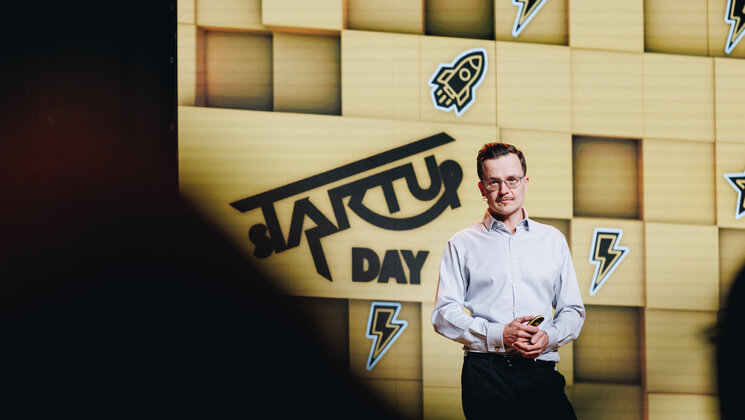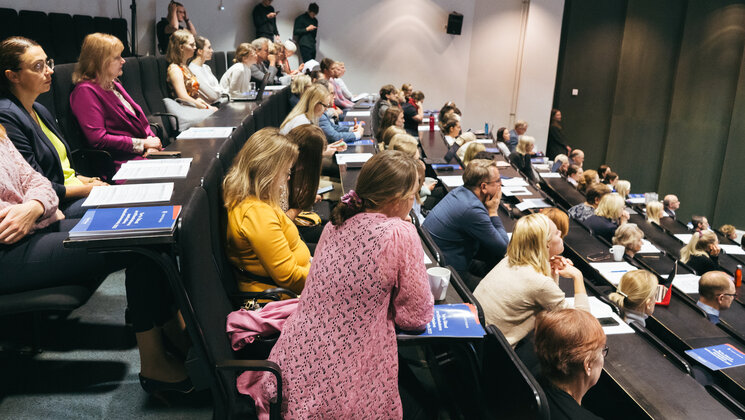RECORDING: webinar on Ukrainian language and culture

On Wednesday, 27 April, a webinar on the Ukrainian language and culture took place on Worksup. Watch the recording. The webinar series about Ukraine goes on until the end of May. Everybody is welcome to listen and think along.
The webinar discussed the history of the Ukrainian language, how Estonians understand and learn Ukrainian through Russian, and what is important to keep in mind when communicating with Ukrainians. Speakers were doctoral student Anna Branets and Research Fellow of Mordvin Languages and postdoctoral researcher Denys Teptiuk, who also teach Ukrainian at the College of Foreign Languages and Cultures.
The seminar took place in English, but questions could be asked in both Estonian and English.
Anna Branets is a doctoral student at the University of Tartu and the University of Groningen. Her research interests include sociolinguistics, multilingualism, interlanguage understanding and foreign language acquisition. Anna studies how Estonians understand and learn Ukrainian through Russian. Denys Teptiuk's research focuses on, among other things, mediated speech and thought in Finno-Ugric and other languages. In addition to Ukrainian, he also teaches Erzya, one of the Finno-Ugric languages.
With the webinar series, the University of Tartu is inviting everyone to support young Ukrainians so that their studies at the university are not interrupted. "The university has already exempted them from tuition fees and given them additional scholarships. These are young Ukrainians already living in Estonia who no longer have the material support of their families and who cannot go to their home country to study because of the war. The scholarship fund aims to give them material security," said Kristi Kerge, Head of International Cooperation of the University of Tartu.
The scholarship fund welcomes donations from both companies and individuals. Donations can be made on ut.ee/donate or by using the QR code below.

Past webinars and recordings
On 24 March, a fundraising event took place to support Ukrainian students, where experts discussed topics related to Ukraine and Russia. The recording of the event (in Estonian) is available on UTTV.
On Wednesday, 30 March, from 16:00–17:30, a webinar “Ukrainian Cities at War: From Conspiracy Theories to New Urban Realities” took place on Worksup. This continued the Ukraine-related discussion that started at the fundraising event on 24 March. The webinar series about Ukraine goes on until the end of May. Everybody is welcome to listen and think along. Watch the recording.
The webinar “Ukrainian Cities at War: From Conspiracy Theories to New Urban Realities” was moderated by Professor of Urban and Population Geography of the University of Tartu Tiit Tammaru. The webinar consisted of presentations by experts in the geography of Ukraine.
-
Kostyantyn Mezentsev, Professor and Head of the Department of Economic and Social Geography at Taras Shevchenko National University of Kyiv: “Ukrainian cities during the 8 years in war: IDPs' expectations and military urbicide“.
This presentation has two parts. Based on the in-depth interviews, it will discuss how IDPs interpret their new realities and to what extent they consider the option of returning to the Donbas. We also consider the experiences among returnees to the temporarily occupied city of Kramatorsk in 2014. The second part explores the ongoing military urbicide perpetrated by Russia in Ukraine. Did the Donbas/Priazov identity in frontline Mariupol impact on its geopolitical victimization?
Kostyantyn Mezentsev's recent research examines the transformation of post-Soviet urban regions and cities, suburban spaces, migration, urban geopolitics, and IDPs issues. He is co-editor of the book Urban Ukraine: In the Epicentre of the Spatial Changes (2017). -
Michael Gentile, Professor of Human Geography at the University of Oslo: “Conspiracy theories and disinformation in Ukrainian geopolitical fault-line cities”.
Conspiracy theories can align with and even amplify existing geopolitical fault-lines, polarizing a population on different sides of a political conflict. Authoritarian regimes deploy disinformation and conspiracy theories to achieve foreign policy goals. The importance of critical juncture events in affecting people’s propensity to believe in conspiracy theories, and the spatiality of (dis/mis-)information in of the geopolitical fault-line cities will be discussed using the case of strategically crucial (frontline) cities in Ukraine.
Michael Gentile is Professor of Human Geography at the University of Oslo, associate editor of Eurasian Geography and Economics, and co-founder of the Cities After Transition research network. He is an expert on Central and Eastern European urban affairs, focusing on Ukraine. During recent years, his interests have focused on identities and conflict in cities located on the geopolitical fault-lines scattered along the margins of post-Soviet space. Recent publications include contributions to Political Geography, Geopolitics and the International Journal of Urban and Regional Research.






